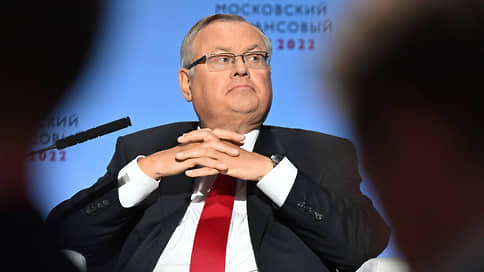VTB sifting grain – Business – Kommersant
[ad_1]

The head of VTB, co-owner of the Demetra-Holding grain holding, Andrey Kostin, suggested to President Vladimir Putin that they seriously limit the work of global agricultural traders in Russia. He proposes to ban companies from “unfriendly countries” from buying and reselling grain and oilseeds, including for export, as well as from owning transshipment and storage facilities. Experts and market participants see the implementation of initiatives as a threat to competition and realizing the potential of grain exports from the Russian Federation.
Andrey Kostin, President and Chairman of the Board of VTB, turned to Russian President Vladimir Putin with a proposal to limit the work of global traders on the Russian grain market. This was reported by Reuters on Thursday, citing a letter. Kommersant also has a copy of the appeal.
According to Mr. Kostin, five international traders, four of which are American companies, play a “key role” in Russian grain exports, accounting for 25-30% of purchases and about 70% of deliveries to foreign markets. This makes Russia an element of the American “grain world order,” the letter said. In addition, the head of VTB continues, exporters from “unfriendly countries” own about 15% of port facilities in the Azov-Black Sea basin, which allows them to derive additional profit from the trade in Russian grain.
Andrey Kostin suggests that Vladimir Putin issue a decree banning organizations that belong to persons associated with “unfriendly states” from buying and reselling legumes, oilseeds and processed products in the Russian Federation, as well as subsequent export.
An exception is the sale of processed products within the country. At the same time, Russian market participants should not be prohibited from selling crops to global traders on FOB (port of shipment) terms, the letter said.
The head of VTB also proposes to ban transactions with the shares of Russian structures in the trade in agricultural raw materials, if they belong to persons associated with “unfriendly states.” And after two months from the date of adoption of the decree, it is proposed to introduce for such persons a ban on ownership, management or control in organizations involved in the transshipment and storage of legumes, oilseeds and processed products.
VTB structures own 45% of Demetra-Holding, which combines several large assets in the grain market. Among them are the Novorossiysk Grain Terminal, shares in the Novorossiysk Grain Plant (NKHP) and the Taman grain terminal complex, 50% minus one share of the United Grain Company (OZK), grain carrier Rusagrotrans by rail, elevators, grain exporter Demetra Trading.
As sources told Kommersant earlier, Demeter Trading had difficulties with the export of grain after the introduction of US sanctions against VTB. Last season, the company ranked second in terms of grain shipments from the Russian Federation with 4.5 million tons. And from July 1 to August 23, Demetra Trading exported about 140 thousand tons, which corresponds to tenth place. Global traders Viterra and Louis Dreyfus in first two months This season, they took the third and fifth places in terms of shipments.
As Andrei Kostin writes, the implementation of VTB initiatives will allow Russia to bring its share in grain trade on the global market in line with its share in world exports, independently determine the geography of importing countries and relations with them, ensure a “fundamentally different” level of pricing, increase tax collection, investment in the industry, and improve food security. Vladimir Putin instructed presidential aide Maxim Oreshkin to consider proposals with the government, follows from a note on a copy of the letter. VTB and Demetra Holding did not provide any comments. Kommersant sent questions to the Ministry of Agriculture.
Andrey Sizov, director of Sovecon, says that the implementation of VTB’s ideas will lead to reduced competition among the largest exporters of Russian grain and, as a result, to lower prices for agricultural producers. He hopes that VTB’s proposals will not be supported as not meeting the interests of farmers. As Mr. Sizov recalls, earlier it was reported about the letter of the head of the bank to Vladimir Putin with a request to limit the offshore transshipment of grain in the port of Kavkaz in order to support the owners of deep-sea terminals, but the idea was never approved.
An interlocutor of Kommersant among traders adds that restrictions on international players will become a precedent and will contradict the position of the Russian authorities, who spoke about supporting foreign business.
At the end of May, the head of the Ministry of Agriculture, Dmitry Patrushev, said at the All-Russian Grain Forum that the ministry was in favor of retaining foreign companies on the market that “honestly fulfill” their obligations.
In addition, the Kommersant source adds, restrictions for global traders may exacerbate attitudes towards Russian grain on the world market, the supply of which is already complicated due to problems with chartering ships, cargo insurance and payments. Finally, this jeopardizes the realization of Russia’s export potential, which is especially important against the backdrop of a record grain harvest, Kommersant’s interlocutor points out. First Deputy Minister of Agriculture Oksana Lut this week estimated the potential for grain exports this season at 50-60 million tons with a harvest of about 140 million tons in net weight.
As Eduard Zernin, Chairman of the Board of the Union of Grain Exporters, recalls, global traders are represented on the Russian market by subsidiaries registered in accordance with the legislation of the Russian Federation, in which Russian citizens work, who, with rare exceptions, also act as top managers. The market share of the “daughters” of global traders in the domestic market does not allow them to manipulate domestic prices, and their participation increases the level of competition and sets a certain standard of activity that corresponds to the practices of the world market, he points out. According to Mr. Zernin, in today’s situation of hidden trade barriers, the participation of international traders in the supply chains of Russian grain supports the stability of exports to key markets.
[ad_2]
Source link





